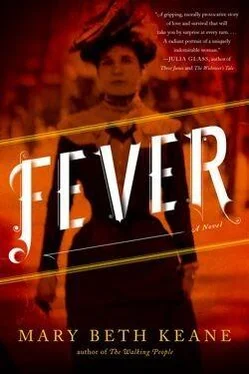You’ll take it, she heard her aunt Kate say. You’ll take it like everyone else.
In the evenings, even though it was late and dark, and even though she didn’t like walking to the boardinghouse at night because the block was almost abandoned, Mary roamed the city and tried to look forward to summer, when there would still be a little light left in the day once her work was over. She drew a large square in her mind and avoided every point between Twenty-Fifth and Thirty-Eighth Streets, and between Second Avenue and Park, in case she would run into someone she knew. Not that it mattered, she reminded herself, with Alfred all the way downtown. After so many years together, even avoiding the place where they’d lived, reminders of him stood on other corners, other blocks. Between the two of them, they’d worked or walked every neighborhood.
At night, in her narrow single room, the light from the lamp not strong enough to read by, Mary lay on her back and remembered she was still young. She was working. She was luckier than most. She was not a woman who felt loneliness. She was not a woman who got weepy or complained. She was not, had never been, and wouldn’t become one now. And then, as sometimes happened when the hour got late, and there wasn’t enough to occupy her, and she couldn’t sleep, and her whole body felt full up with a question in need of an answer though she couldn’t think of exactly what the question might be, she thought of him, the other him, that baby, that boy, dead now for eleven years. She imagined Mr. Kirkenbauer remarried, with other children, another wife, another new house. Did anyone ever visit that boy? He’d been thriving when she met him. He’d been growing, and running, and learning his words, and accepting everything he was taught with joy. And then Mary had arrived for a job and he was dead within five weeks. That one, that baby, more than any of the ones on Dr. Soper’s list, more than even her sister’s twins who’d seemed like little more than empty vessels from the very start, more than any of the ones they accused her of harming, Tobias Kirkenbauer bothered her most.
If it was her fault, like they said it was. If she was to blame. If she was a walking, breathing germ, a death sentence. If it was her arrival that had killed him. Her letting him eat off her spoon. Her kissing him and squeezing him. If he really did die because of her, then she asked Jesus for Mercy. She didn’t mean to, she told God. She didn’t know. Late at night, long after the other boarders were most likely asleep in their beds, she wondered about all those lab tests that came back positive, and all those lectures they gave to her about Typhoid bacilli and hot soup versus cold salad, and what heating at high temperatures does to food, and where germs like to grow and thrive, and how, in all likelihood, it was her ice creams and puddings that were to blame. She thought back to the ship that brought her to America, and all those bodies that had been dropped into the gray ocean, a trail of heavy, sewn-up sacks she could follow back home, if she ever chose to leave America one day.
Anyway, it didn’t matter anymore, Mary told herself in the morning as she rushed to rub a washcloth over her face. It didn’t matter, she repeated as she struggled to pull on thick tights under her skirt, and watched her own breath hover around her face as she grew more agitated. She knew, once again, that she hadn’t killed that boy any more than she had killed any of the other people in that great, wide, filthy, throbbing city. It would be laughable, really, if it weren’t already criminal for them to have locked her up, one woman, a cook, when every corner of America hid a pestilence just waiting to be stirred up, set free.
• • •
After six weeks at the laundry she’d made enough to rent a bed from a widow on the west side. She’d seen the ad in the paper, and instead of mailing her inquiry across town she’d walked it over and pushed it through the mail slot of the building. Although the building was not grand, Mary acknowledged when she was back on the sidewalk looking at it that it was a perfectly decent one. And with just two women in the rooms it wouldn’t be much to keep it clean and everything in its place. The widow wrote to Mary with the date that she should come and the price of the bed. It will be like living with Aunt Kate, Mary decided as she gathered her few things from the boardinghouse. It’ll be something to get used to at first but after a while it will become routine, and she’ll look forward to seeing me, and who knew? Mary might be there for the rest of the woman’s life. She’d heard plenty of cases where a boarder becomes like one of the family, and she didn’t see why it wasn’t possible in her case as well. How difficult it must be, she thought as she crossed the avenues and bent her head against the spring wind, to be an old woman in this city, to have to worry about gathering wood or coal, putting food on the table.
She walked and walked, and finally turned on Eighth Avenue for the final stretch.
“Yes?” a woman answered Mary’s knock, but a young woman, younger than Mary, with Mary’s same style of hair and a nicer blouse.
“I’m here about the bed. I wrote last week and Mrs. Post wrote back to say I should come today.”
The woman sighed, throwing up her hands. “Come in.” She moved aside with a theatrical half curtsy, and Mary stepped past her into the small kitchen. She admired the window over the sink, and the little square of stained glass that someone had hung to catch the light. Then she turned slightly and noticed a cot. That would be fine. She’d slept in plenty of kitchens. Abutting the foot of that cot, she noticed another. Then, on the other side of the kitchen, another.
“Oh, there’s more,” the woman promised, pointing to the next room. Mary peeked into a darkened bedroom and took in the larger bed pushed up against the wall, the buffer of cots all around. There was nowhere to walk. The person or people who slept in the larger bed must have to crawl over the cots to get to the door.
“But the ad,” Mary said, wanting to argue the situation into the one she’d imagined, and not the one that was.
“Look, you want to stay? Great. I’m out of here next week. You on a regular shift or a night shift?”
“Regular. Day.”
“Well, that’s working for you. The night shifts — we have two nurses here — are the real losers in this. They can’t get a wink all day with the racket she makes. She needs us here but she hates us here. You already left the other rooms you were in?”
Both women looked down at Mary’s small bag, and the other woman laughed.
Mary’s was one of the cots in the bedroom. She thought she’d gotten lucky when she saw that hers was closest to the door, but then she learned she’d been right when she imagined that the others would have to crawl across the other beds in order to get out of the room. In the middle of the night she was woken by a knee near her face, a foot flicked across her belly, the general rocking and creaking her cot made with the weight of another body trying to pass. There was a flushing indoor lavatory down the hall from their rooms, but long before Mary’s arrival, someone had made the decision that the hallway privy encouraged too much movement in the middle of the night, and so a chamber pot was set up in the corner of the bedroom farthest from the door. If she wasn’t woken by someone traveling on top of her, she woke to the sound of someone letting go a stream of urine into a ceramic pot, followed by the sound of four other women tossing violently in their sleep to shut out the noise.
She had to find something else. She thought about her old building, about Fran and Joan. Fran’s place was full up with her own family, and Joan? They would make room for her, she knew. They would sympathize. But it was their sympathy that stopped her. They had each warned her about Alfred in their different ways — Joan quietly, and Fran less so, but she had not listened. And now here she was, just a few years later, living in a boardinghouse while Alfred made a new family with a new woman. No, she wouldn’t be able to stomach it, the inevitable human need they’d have to point out that they’d been right, and she was wrong. Instead, she asked Li if he knew of anyone looking for a boarder. She told him she’d even live with a Chinese. She tried to ask the Lithuanians, but they didn’t understand her. She stopped in at all the churches, Catholic or not, between the laundry and Mrs. Post’s, to read the bulletin boards. She scoured the ads in the papers. She quietly suggested to two of the other women at Mrs. Post’s that they strike out together and find a place to themselves, but neither of them was interested, or else they didn’t believe it would be possible for three women to rent rooms together without a man to sign for them.
Читать дальше












